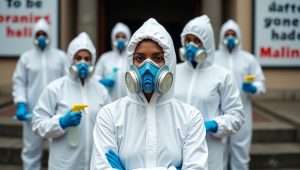
Human Metapneumovirus (HMPV) is an emerging respiratory virus that has become a growing concern in Indonesia. Known for causing respiratory infections ranging from mild cold-like symptoms to severe illnesses such as pneumonia, HMPV poses a significant risk, especially to vulnerable populations like young children, the elderly, and those with weakened immune systems. While there is no specific treatment or vaccine for HMPV, taking preventive measures can significantly reduce the risk of infection. This article outlines simple and practical steps Indonesians can take to stay safe from HMPV.
Understanding HMPV and Its Transmission
HMPV spreads primarily through respiratory droplets when an infected person coughs, sneezes, or talks. The virus can also be transmitted by touching contaminated surfaces and then touching the face, particularly the eyes, nose, or mouth. Crowded environments, such as public transportation, markets, and schools, provide ideal conditions for the virus to spread. Therefore, awareness and proactive prevention are essential in reducing the impact of HMPV in Indonesia.
Simple Steps to Prevent HMPV
- Practice Good Hand Hygiene
Regular handwashing is one of the most effective ways to prevent the spread of HMPV and other respiratory viruses. Wash your hands with soap and water for at least 20 seconds, especially after being in public places, coughing, sneezing, or touching your face. If soap and water are not available, use a hand sanitizer containing at least 60% alcohol. - Wear a Mask in Crowded Areas
Wearing a mask, particularly in crowded or poorly ventilated spaces, can help reduce the transmission of respiratory droplets. Masks provide a barrier that protects both the wearer and others from respiratory viruses like HMPV. This is especially important during the rainy season when respiratory infections are more common in Indonesia. - Avoid Close Contact with Sick Individuals
If someone around you is showing symptoms of a respiratory illness, such as coughing or sneezing, maintain a safe distance to reduce your risk of infection. Similarly, if you are feeling unwell, stay home to avoid spreading the virus to others. - Clean and Disinfect Frequently Touched Surfaces
HMPV can survive on surfaces for several hours, making it important to regularly clean and disinfect frequently touched objects and surfaces, such as doorknobs, light switches, mobile phones, and countertops. - Boost Your Immune System
A strong immune system can help your body fight off infections, including HMPV. Maintain a healthy diet rich in fruits, vegetables, and protein, and stay hydrated. Regular exercise, adequate sleep, and stress management also play a crucial role in supporting immune health. - Teach Children Healthy Habits
Children are particularly susceptible to HMPV and often spread viruses in schools and daycare settings. Teach children to cover their mouths and noses with a tissue or their elbow when coughing or sneezing, and to wash their hands frequently.
When to Seek Medical Attention
While most cases of HMPV result in mild symptoms, severe cases can lead to complications such as pneumonia or bronchiolitis. Seek medical attention if you or a family member experiences:
- Difficulty breathing
- Persistent high fever
- Severe fatigue or lethargy
- Symptoms that worsen over time
Early diagnosis and treatment can help prevent complications and improve recovery outcomes.
Community Efforts to Prevent HMPV
Preventing the spread of HMPV requires collective effort. Public health authorities in Indonesia should focus on raising awareness about the virus, promoting hygiene practices, and improving access to healthcare services. Schools, workplaces, and community organizations can play a vital role by implementing hygiene protocols and educating individuals about preventive measures.
Conclusion
HMPV is a growing public health concern in Indonesia, but simple preventive measures can go a long way in reducing its spread